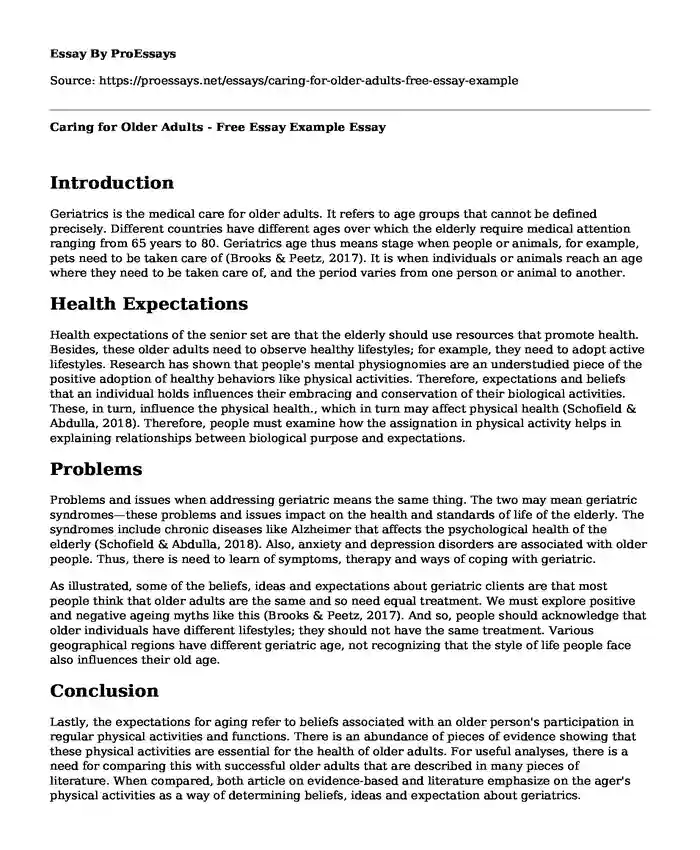Introduction
Geriatrics is the medical care for older adults. It refers to age groups that cannot be defined precisely. Different countries have different ages over which the elderly require medical attention ranging from 65 years to 80. Geriatrics age thus means stage when people or animals, for example, pets need to be taken care of (Brooks & Peetz, 2017). It is when individuals or animals reach an age where they need to be taken care of, and the period varies from one person or animal to another.
Health Expectations
Health expectations of the senior set are that the elderly should use resources that promote health. Besides, these older adults need to observe healthy lifestyles; for example, they need to adopt active lifestyles. Research has shown that people's mental physiognomies are an understudied piece of the positive adoption of healthy behaviors like physical activities. Therefore, expectations and beliefs that an individual holds influences their embracing and conservation of their biological activities. These, in turn, influence the physical health., which in turn may affect physical health (Schofield & Abdulla, 2018). Therefore, people must examine how the assignation in physical activity helps in explaining relationships between biological purpose and expectations.
Problems
Problems and issues when addressing geriatric means the same thing. The two may mean geriatric syndromes—these problems and issues impact on the health and standards of life of the elderly. The syndromes include chronic diseases like Alzheimer that affects the psychological health of the elderly (Schofield & Abdulla, 2018). Also, anxiety and depression disorders are associated with older people. Thus, there is need to learn of symptoms, therapy and ways of coping with geriatric.
As illustrated, some of the beliefs, ideas and expectations about geriatric clients are that most people think that older adults are the same and so need equal treatment. We must explore positive and negative ageing myths like this (Brooks & Peetz, 2017). And so, people should acknowledge that older individuals have different lifestyles; they should not have the same treatment. Various geographical regions have different geriatric age, not recognizing that the style of life people face also influences their old age.
Conclusion
Lastly, the expectations for aging refer to beliefs associated with an older person's participation in regular physical activities and functions. There is an abundance of pieces of evidence showing that these physical activities are essential for the health of older adults. For useful analyses, there is a need for comparing this with successful older adults that are described in many pieces of literature. When compared, both article on evidence-based and literature emphasize on the ager's physical activities as a way of determining beliefs, ideas and expectation about geriatrics.
References
Brooks, S. E., & Peetz, A. B. (2017). Evidence-based care for geriatric trauma patients. Surgical Clinics, 97(5), 1157-1174.
Schofield, P., & Abdulla, A. (2018). Pain assessment in the older population: what the literature says. Age and Ageing, 47(3), 324-327.
Cite this page
Caring for Older Adults - Free Essay Example. (2023, Nov 25). Retrieved from https://proessays.net/essays/caring-for-older-adults-free-essay-example
If you are the original author of this essay and no longer wish to have it published on the ProEssays website, please click below to request its removal:
- Case Study Example: Health and Social Care for Carol's Family
- Research Paper on Personal-Centered Therapy
- Dying to Be Thin Essay Example
- Nurses' Transformations: 1958-1978 in K. McPherson's Bedside Matters - Essay Sample
- Human Behavior: Bandura's Theory of Human Agency - Essay Sample
- Bondage Breakers Foundation: Breaking Mental Health Disorders & Improving Lives
- Essay Example on Disabilities & Our Communities: Inevitable Issues & Anticipated Futures







